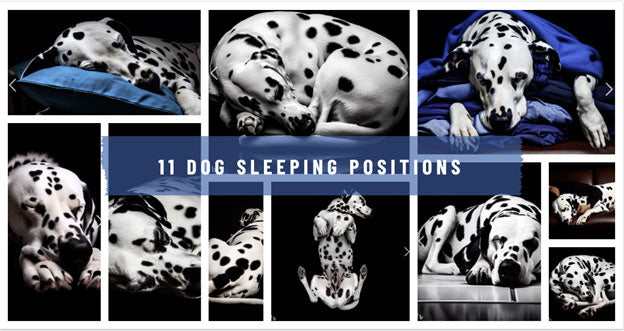
Why Is My Dog Breathing Fast?
Disclaimer: Some of the links in our blog posts are affiliate links. This means we may earn a small commission if you make a purchase through them which helps support our blog, at no extra cost to you.
Pet owners must be vigilant about their dogs' respiratory health. A dog breathing heavily or fast can indicate breathing issues that should be closely monitored. A healthy respiratory breathing rate for dogs typically falls between 15 to 30 breaths per minute while resting or sleeping. If you count your dog breathing abnormally fast, say around 40 breaths per minute, it's a sign that something may be amiss.
Dogs regulate their body temperature through panting, but rapid breathing, particularly from the mouth and upper respiratory area, may suggest a problem. If you notice your dog's reluctance to drink, eat, or move, combined with a respiratory rate exceeding 35 breaths per minute, it's vital to contact your vet immediately. Pale blue-tinged or brick-red gums are also concerning indicators of respiratory distress. Potential causes of fast or heavy breathing in dogs include underlying health issues, so keeping a close eye on your pet's normal respiratory rate is key to their well-being.
Cause of Your Dog Breathing Heavy
When your furry companion starts breathing heavily, it is a cause for concern. Thus, we explore the potential causes of fast or heavy breathing in dogs, which include the following:
Dog breeds with squished faces or shortened snouts, such as Boston terriers, boxers, and pugs, are prone to heavy breathing. A dog breathing fast at rest may indicate an injury or illness and require immediate evaluation. Some of the potential causes of fast or heavy breathing in dogs include:
Respiratory Distress
Heavy breathing or a respiratory rate above 35 breaths per minute may indicate a problem. Also, pale blue-tinged or purple-tinged gums are a sign of respiratory distress. Dogs can experience upper respiratory tract distress and lower respiratory tract distress.
-
Upper Respiratory Tract Distress: Dogs with upper respiratory tract issues may show symptoms like stridor or stertor. Treatment starts with sedation, and medical interventions such as airway surgery may be necessary. Laryngeal paralysis is a common condition that affects the upper airway.
-
Lower Respiratory Tract Distress: Lower airway issues in dogs involve the lungs and bronchi. Symptoms include wheezing, heavy breathing, and coughing. Treatment options include bronchodilators, corticosteroids, and oxygen supplementation. Examples of lower airway conditions are asthma and chronic bronchitis.
Congestive Heart Failure
Dogs breathing heavily can be a sign of heart disease. Dogs with heart disease may have heavy breathing, coughing, exercise intolerance, and an elevated respiratory rate. Congestive heart failure causes lung fluid buildup, leading to pulmonary edema and impaired oxygen exchange. As a result, dogs breathe more rapidly and forcefully to get enough air and oxygen.
Pleural Space Diseases
Pleural effusion is fluid buildup in the pleural space between the layers of the pleura. It can reduce lung expansion, cause rapid, shallow breathing, and affect oxygenation. Dogs can also suffer from pneumothorax, hemothorax, pyothorax, and chylothorax.
Pulmonary Thromboembolism (PTE)
PTE is caused by blood clots in the lungs, which can impede oxygen delivery. Certain illnesses increase the risk of clots. Treatment involves oxygen, anticoagulants, and thrombolytic therapy. Symptoms include heavy breathing, respiratory distress, pale mucous membranes, coughing, and potential collapse.
Abdominal Distension
A dog's heavy breathing can result from abdominal distension, which limits lung expansion by pressuring the diaphragm. Causes include injuries, ruptured masses, liver disease, heart failure, organ enlargement, cancer, and excessive fat accumulation.
Non-Respiratory Causes
Heavy breathing in dogs can have causes beyond lung issues, such as stress, fear, pain, metabolic acidosis, DKA, kidney failure, anemia, and low hemoglobin levels.
How to Treat a Dog's Rapid Breathing?
If your dog is breathing abnormally fast, such as exceeding 40 breaths per minute, it could signify an underlying problem. Furry companions should be closely monitored by pet parents, especially if their dog shows reluctance to drink, eat, or move. Treating a dog's rapid breathing depends on the underlying cause. Here are some general steps:
-
Assess the Situation: Determine if your dog is in immediate distress. If they're overheated or panicked, try to calm them down.
-
Cool Your Dog: If your dog is overheated, move it to a more relaxed area, offer fresh water, and use a wet cloth to cool it down. Avoid ice-cold water, as it can shock its system.
-
Provide Fresh Air: Ensure your dog can access fresh air and isn't in a stuffy or confined space.
-
Monitor Closely: Monitor your dog's breathing rate, heart rate, and overall condition. If symptoms worsen or persist, contact your vet immediately.
-
Avoid Overexertion: Rest is crucial. Avoid strenuous activities until your dog's breathing returns to normal.
-
Visit the Vet: If rapid breathing continues, is accompanied by other concerning symptoms, or if you're unsure of the cause, consult your veterinarian for a thorough examination and diagnosis.
Remember, rapid breathing can indicate various health issues, so prompt attention and professional guidance are essential for your dog's well-being.
Know More: 15 Bad Dog Behaviors- What They Mean and How to Correct Them
If you wonder why my dog is breathing fast, it may have an underlying health issue requiring immediate attention from a vet. Your love and concern for your fur baby are unlimited. Immortalize the loving bond with a personalized dog portrait. These customized gifts also make heartfelt presents for other dog lovers. Gift a fellow pooch lover a custom pet gift. You could choose from a range of products like custom pet mugs, phone cases, blankets, and pillows.
Popular Blog
7 Unique Products That Every Dog Owner Will Love
Let’s be honest, our dogs run the house. They make us laugh, steal our socks,...
50 Funny Dog Birthday Puns for a Tail-Wagging Good Time!
Here is a delightful collection of 50 dog birthday puns guaranteed to bring s...
Homemade Dog Toys Your Pooch Will Love: Top 10 DIY Delights
Pet toys, especially safe dog toys, can be expensive and don’t last too long....
Canine Companions Worldwide: Modern Treatment & Taxes for Dog Owners
The intricate relationship between humans and dogs is a testament to a profou...











